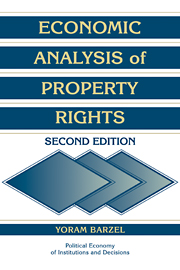Book contents
- Frontmatter
- Contents
- Series editors' preface
- Preface to the second edition
- Preface to the first edition
- Introduction
- 1 The property rights model
- 2 The public domain: Rationing by waiting and price controls
- 3 Contract choice: The tenancy contract
- 4 Divided ownership
- 5 The old firm and the new organization
- 6 The formation of rights
- 7 Slavery
- 8 Wealth-maximizing constraints on property rights
- 9 Property rights and non-market allocation
- 10 Additional property rights applications
- 11 The property rights model: Recapitulation
- References
- Index
4 - Divided ownership
Published online by Cambridge University Press: 05 June 2012
- Frontmatter
- Contents
- Series editors' preface
- Preface to the second edition
- Preface to the first edition
- Introduction
- 1 The property rights model
- 2 The public domain: Rationing by waiting and price controls
- 3 Contract choice: The tenancy contract
- 4 Divided ownership
- 5 The old firm and the new organization
- 6 The formation of rights
- 7 Slavery
- 8 Wealth-maximizing constraints on property rights
- 9 Property rights and non-market allocation
- 10 Additional property rights applications
- 11 The property rights model: Recapitulation
- References
- Index
Summary
In Chapter 3, I pointed out that in order to cooperate, resource owners must cede to each other control over some of the attributes of their resources. Since it is too costly to price every attribute, their use will be sub-optimal, and some potential gains will be forsaken as a result. Sole ownership of all of the resources involved would eliminate the deadweight loss associated with cooperation. However, sole ownership may result in yet a greater loss due to reduced specialization; if this is the case, it will not be chosen. It might appear that in the case of commodities or assets that consist of single physical entities rather than those that are more complex, sole ownership would be routinely adopted. But because most, if not all, transacted commodities have many attributes, multiple ownership of commodities may be preferred to sole ownership. In this chapter, I shall suggest sources of potential gains from multiple ownership, offer hypotheses regarding the form the division of ownership will take, and discuss the organizations that are expected to emerge to handle relations among the owners.
The physical entities I consider to be commodities or assets typically consist of many attributes, and often different subsets of asset-attributes are owned by different individuals. For instance, the economic and legal ownership of every asset subject to guarantee (or to liability) is divided between its holder and its guarantor; similarly, the ownership of every rented asset is divided between the nominal owner and the renter.
- Type
- Chapter
- Information
- Economic Analysis of Property Rights , pp. 55 - 64Publisher: Cambridge University PressPrint publication year: 1997



